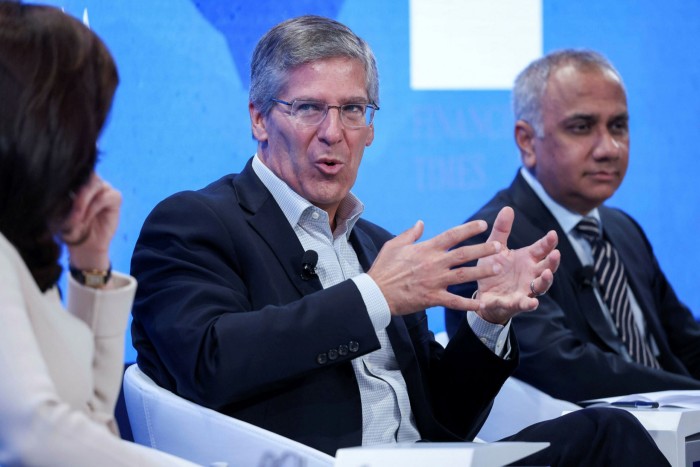Six insights into how business can bridge the skills gap


Roula Khalaf, Editor of the FT, selects her favourite stories in this weekly newsletter.
If you want to persuade entrepreneurs, chief executives and policymakers to do something, you usually have to put a figure on the potential benefits.
So it was that the World Economic Forum and PwC calculated in 2021 that giving people the skills they needed to succeed in the economy of the future could add $6.5tn to global GDP by 2030 — if skills gaps were bridged by 2028.
That bold prediction concealed a multitude of variables, though. For one thing, the report’s estimates “only reflect[ed] closing currently observable skills gaps”, and did not take into account the likely emergence of new types of job as a result of innovation and automation.
Since 2021, the great resignation — the broad term for the late-pandemic trend for millions to quit or change jobs — has further complicated a skills puzzle made up of interlocking economic, corporate and individual decisions.
Here is what I learnt from talking and listening to experts at the recent WEF annual meeting in Davos about how to solve that skills puzzle.
First, assessing what is needed is a dynamic process. Skills are playing an even larger part than they used to in determining how individual staff shape their careers, or have them shaped for them. At the same time, the skills that staff require for the future are changing faster than ever.
LinkedIn compared the skills its members had listed as most important for particular jobs in 2015 with those for the same jobs in 2021. A quarter of those skills had changed in six years. Partly because of an acceleration in automation during the pandemic, the social network estimates that between 39 and 44 per cent of vital skills could change again by 2025.
Another WEF report in 2020 suggested the top five skills for 2025 would include “analytical thinking” and “active learning” — precisely the sorts of “soft” areas that are harder to teach, quantify and digitise.
At an individual company level, according to Bob Moritz, global chair of PwC, upskilling cements trust between employer and employee. Staff without skills were more likely to quit, he told one Davos panel.

On the other hand, the acquisition of skills, particularly in high-demand areas such as information technology and engineering, makes staff more marketable outside their company, or country. That is a problem for developing countries, said Tunisia’s prime minister Najla Bouden. One-third of Tunisia’s engineers and entire cohorts of freshly minted IT graduates leave the country on graduation, she said: “We produce good knowledge but we absorb little of it.”
Second, the way job-fitness is assessed is changing. Employers are increasingly looking at what candidates can do rather than their formal qualifications. A degree may be a useful indicator of mastery of core knowledge in, say, physics and maths. But “a degree alone doesn’t tell you what’s in the box”, according to LinkedIn co-founder Allen Blue.
Jeff Maggioncalda, chief executive of online learning platform Coursera, suggested that such perma-qualifications should be combined with higher-velocity training in fast-emerging tools and techniques.
Blue also pointed to an important byproduct of favouring skills over formal qualifications. A skill-based approach opens the door to potential recruits from under-represented backgrounds with non-traditional educations because “it doesn’t really matter where you come from or what kind of experiences led you to have these skills” (of course, both LinkedIn and Coursera, as platforms that highlight skills, have a strong interest in promoting a skill-based approach).
Third, to work effectively, upskilling programmes require the close involvement of employers and educators — and, by extension, sometimes governments — in the redesign of curriculums, jobs and policies.
The traditionally hands-on Singaporean government knew 15 or 20 years ago that its population would need new skills to take advantage of the digital revolution. Singapore’s “secret sauce”, according to its communications and information minister Josephine Teo, was that everyone came together to design a dynamic and adaptable system.
Some jobs in digital marketing, data science and user experience design did not exist at the time, making a flexible approach essential, she pointed out. “If we expected that these job roles can only be filled by people who emerged from the school system, we would have a tremendous number of people who were underemployed, and that’s a huge waste to the system and a great tragedy for the individuals.”
Fourth, workers are not the only ones who need to reskill and upskill. For instance, team leaders are having to adapt to new flexible and hybrid work practices that evolved quickly during coronavirus lockdowns. “We need upskilling of workers in terms of using the technologies, but [we also need] upskilling of managers,” said Christy Hoffman, general secretary of UNI Global Union, which represents service-industry staff.
Fifth, in a tight labour market, companies need to “grow their own timber”, in the words of Shobana Kamineni, executive vice-chair of India’s Apollo Hospitals.
Particularly in hot recruitment areas, such as software development, companies do not have the luxury of being able to choose from a range of “plug-and-play” external candidates, according to Singapore’s Teo. “They have to make the effort [to upskill their staff],” she says, “because otherwise, they would never be able to hire.”
Finally, as the unexpected great resignation has demonstrated, employers and economies underestimate the power of individuals to determine their own future at their peril — though that power may take a passive form. While some people possess “a tremendous urgency” about the need to acquire new skills, Salil Parekh, chief executive of Indian IT group Infosys, told the Davos summit, “a large number of people don’t have it”.
If employers and governments cannot instil, in Parekh’s words, “a certain level of excitement” about upskilling — and persuade workers of the need for life-long learning — everyone will suffer.
Andrew Hill is the FT’s senior business writer
Comments